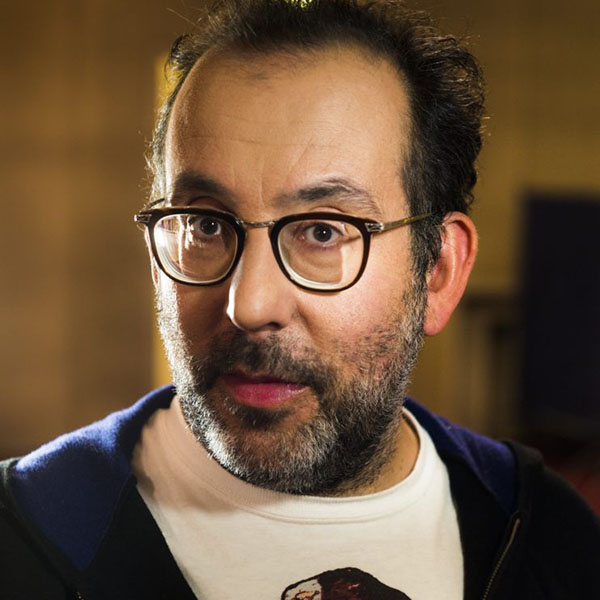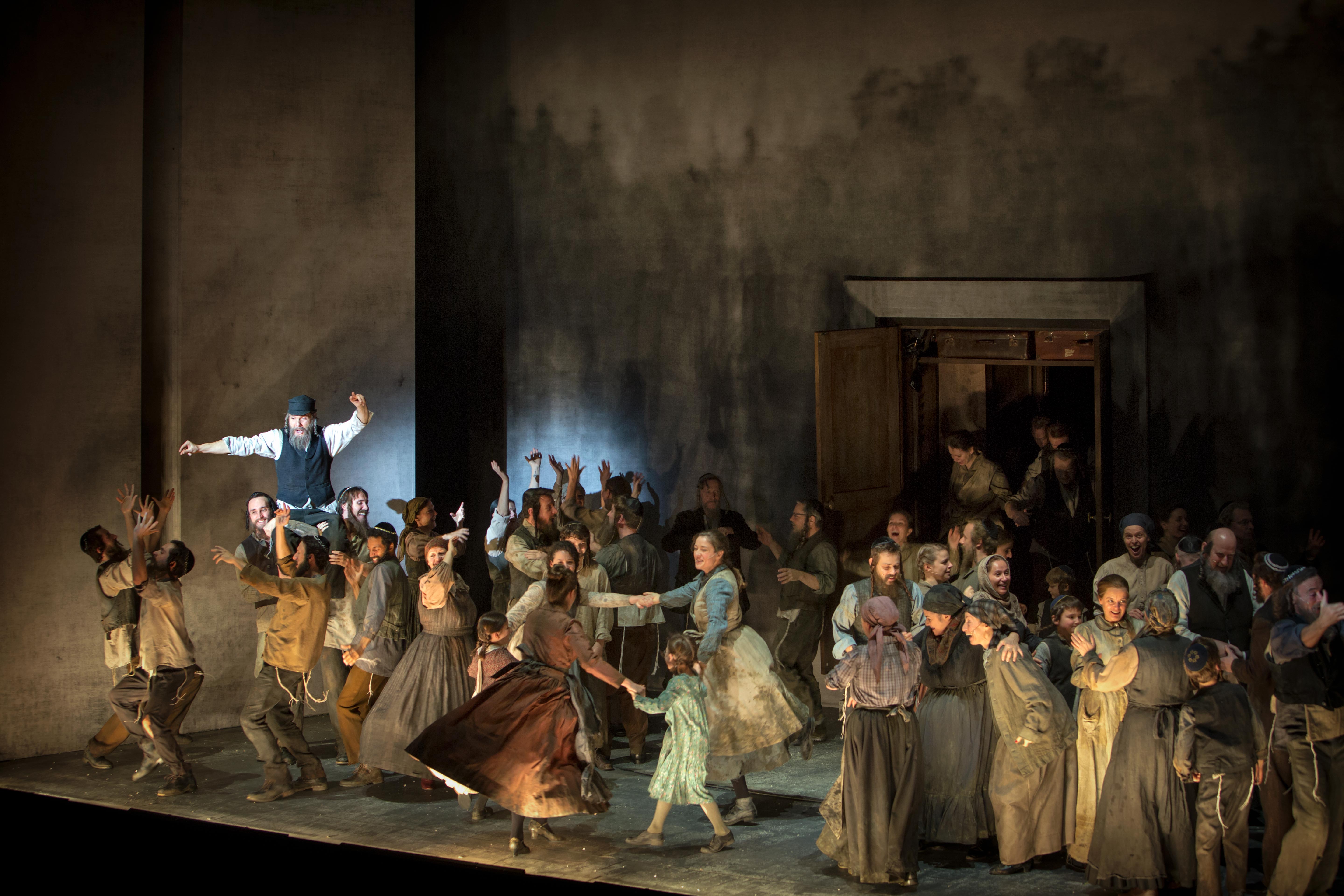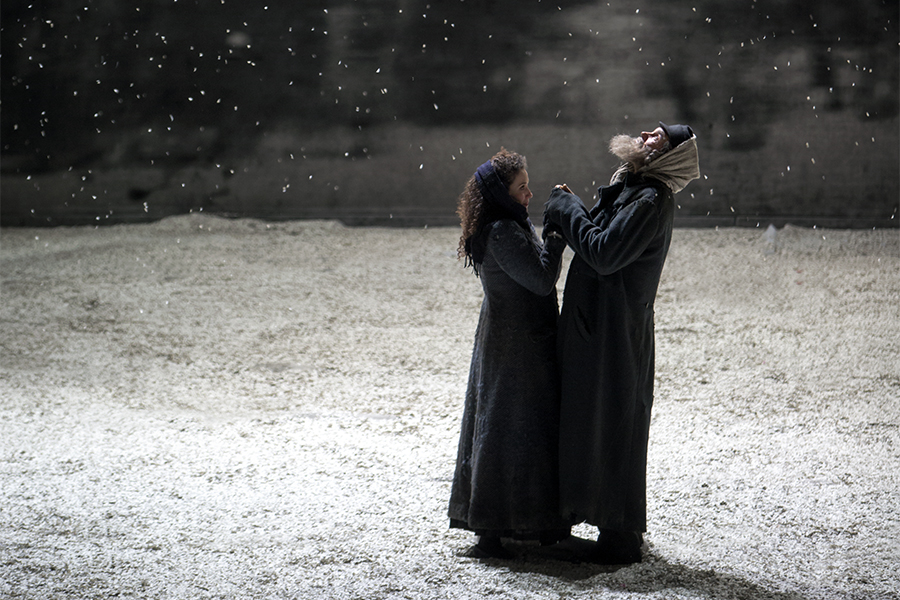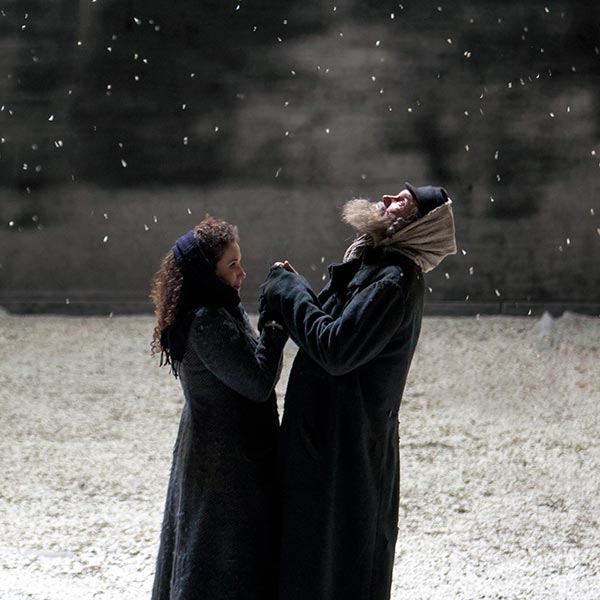August 19, 2022
Making it personal
Director Barrie Kosky on Fiddler on the Roof
The director Barrie Kosky, Australian by birth, makes his home in Berlin, where he served as artistic director of the Komische Oper for ten seasons. While there, he created many new productions, including a silent-movie-inspired production of The Magic Flute that featured in Lyric's 2021-22 season, and this highly successful production of Fiddler on the Roof, making its United States debut here. Lyric spoke with Kosky about his life with Fiddler and the show's legacy.

Do you have some personal history with this show?
My parents had the original Broadway recording with Zero Mostel, which I used to dance around to in my bedroom before I'd seen the film or the show on stage. I can still see the record cover as I speak. I danced around to the music, which I found very infectious, and also I loved the sort of melancholy without knowing what melancholy is.
Did you see it while you were still a kid?
I remember trying to sit through the film on television, being a bit bored by it when I was an adolescent — too long, and something about Topol [who played Tevye] irritated me and still does. Then I saw it on the stage around the same time. The production was done by Opera Australia in Melbourne, so it was a larger, operatic version, and I loved it then when I saw it onstage.
And it was your parents' record... it must have had some connection with your family.
In any diasporan Jew's upbringing, in the English- speaking world, Fiddler plays a part. Fiddler on the Roof is either something you adore and love or something you run away from. I have a lot of Jewish friends who can't listen to one single note of it, but I think it's ingrained in the diaspora's DNA, for good and for bad, too.
DNA! That's going back a long way.
The other bit of connection personally is that the shtetl Anatevka is exactly like the shtetl that my grandparents came from when they left Belarus in the early part of the 20th century, almost the same time as Tevye. There's a very beautiful poster on my wall in Berlin of my very young grandfather before his bar mitzvah, so he must have been around 10 or so, with my great-grandfather, who looks just like Tevye from central casting. So I've always had this slight fantasy that my great-grandfather was Tevye.

Was it a dream of yours to have a chance to direct Fiddler on the Roof?
Oh yes. I've done three musicals at the Komische Oper in a way that no ordinary production could do. I did Kiss Me, Kate in 2008, West Side Story in 2013, and Fiddler on the Roof. All three were with a very large orchestra, as they were written for, which you never get now. When you hear Kiss Me, Kate or West Side Story performed by an orchestra of 60 or 70, it's a very different experience. If you do Fiddler on the Roof with an opera company, you can have a real shtetl on stage, you can have over 150 people on stage. No Broadway or West End theater could ever do that.
Visually, what were you hoping for with the production?
Our set is made up of hundreds of pieces of second- and third-hand furniture from East and West Berlin shops. Bits of wardrobes, bits of tables, and it's all piled together like the shtetls were. People lived side by side. There are no rooms in our production. People enter through doors that are in the wardrobes. People can hide and move and climb. This is like a potpourri of furniture. This furniture that we got, none of it is made for the show. Some of it is from old East German families, and some of it is probably — because it was still in Berlin — from old Jewish families from the '30s. So it has an enormous power.
One similarity with non-opera-house productions is that these performers come more from the musical-theater world than the opera world.
I did not use opera singers for the main roles because the main roles, I think, are acting roles. They need actors who can sing, not singers who can act. The last thing I want to hear is an opera singer sing Tevye.
You think acting is paramount for a great Tevye?
I think — I'm putting myself on the line here — I think Tevye's the greatest role in musicals for a man. I do. I think it's the Mother Courage of male musical roles. It's existential. He talks to God. He talks about really large issues with great irony and humor. Tell me another musical where the lead male carries the show with such complexity and humor and emotion.

He has to show heartbreak, and he also has to communicate that he recognizes the need to change.
In rehearsal, we talked about what happens to Tevye and Golde when they land at Ellis Island. I imagine Tevye had a great time in New York. And then his daughters of course went to school, went to university, and became famous lawyers. That's the great joy of immigration, and second- and third-generation immigrants. What's great about the piece is it's not didactic. It doesn't say to the audience, 'This is what you should feel, this is what you should think at the end.' It's all before the Holocaust and never mentions the Holocaust. And yet the shadow of the Holocaust is right through it. You think to yourself, 'Uhhh, the daughters that stay—are they going to get out in time?' I always had the feeling that Hodel and Perchik died, that they never got to America, that [Tevye and Golde] never saw them again.
Do you think the stakes of the daughters' relationships in Fiddler feel the same for modern audiences? When the musical first opened, marrying outside one's religion or race or inside one's gender were much less accepted than they are now. Now all those things are barely debated.
You seem to have a very utopian, rose-colored vision of gay marriage. It's certainly approved by the people we know, but it's not approved by everybody. You don't see rainbow flags in small German villages glorifying gay marriage. I think interracial marriage is still, in lots of communities, a huge, huge problem. So I would actually disagree with you. The piece becomes, as the years go on, even more pointed and contemporary. The idea of parents wanting their children to do certain things is unfortunately like it's been for thousands of years. I don't think it's changed at all.
Do you think that's why the show is so widely loved and performed? That it could really be about any community of people, not specifically early 20th-century European Jews?
Universality comes from specificity. If something's universal, it's because it's specific. I don't know how much Japanese audiences know about Judaism, but they certainly relate to the story of this father and his five daughters. Can you maintain tradition and change? Is it possible to maintain one foot in tradition and one foot in the future?
Is part of your message with this production that Fiddler on the Roof, the show, must also confront the tension between the traditional presentation of the beloved musical and its continued relevance to a changing world?
Absolutely. Sometimes we forget that. People think, 'Oh, it's such a lovely play and musical. I love the songs.' Everyone knows what's going to happen, and you think, 'This is harmless, this is kitschy.' The piece itself is set in Ukraine. This is where the Russian government, for a time, allowed Jews to settle and live and work without being able to own the land. But this is all set in what are now battlefields. This area for hundreds of years has been fought over, abused, trampled through. There are many, many ghosts here. When you see the photos of people with very similar-looking wagons to Tevye's and Golde's at the end hauling their possessions — when you stand in the Berlin railway station and you see the trains coming in from Ukraine daily, from Budapest and Warsaw, with mothers and children with tiny amounts of luggage, you can't help but think Fiddler on the Roof is the show for this moment. How much more contemporary can you get?
September 17 - October 7, 2022
Fiddler on the Roof
Fiddler on the Roof
One of the world’s leading opera directors, Barrie Kosky is celebrated from Vienna to Paris and from Bayreuth to London, where his new Ring cycle will take the stage at the Royal Opera starting next year. When his production of Fiddler on the Roof premiered at Komische Oper Berlin in 2017, international critics heralded the arrival of a completely original and unique experience created from this revered, Tony Award-winning masterpiece. “Songs many of us have heard our whole lives sentimentalized...are given weight and take on deep meaning,” raved the Los Angeles Times. Experience a Fiddler like no other, with the full power of the Lyric Opera Orchestra and Chorus as well as a production that is both grand in scale and intimate in its power to bring you directly to the heart of the village of Anatevka. Join us as Tevye, his wife Golde, and their five daughters experience the real joys and sorrows that have made this meaningful work an enduring part of our culture.

